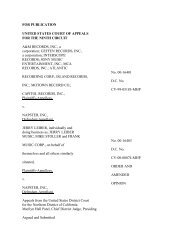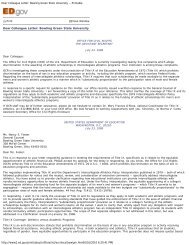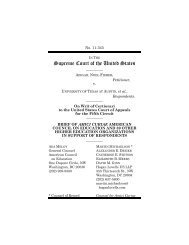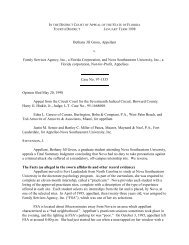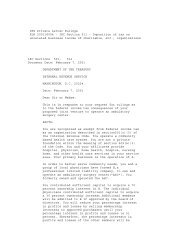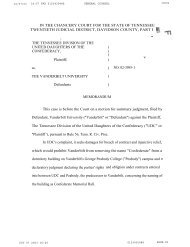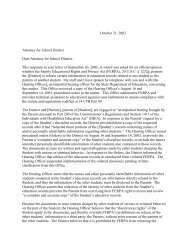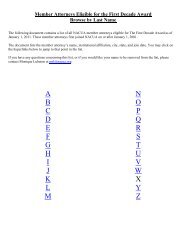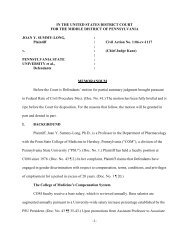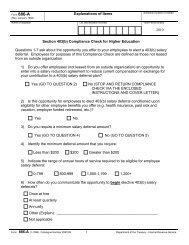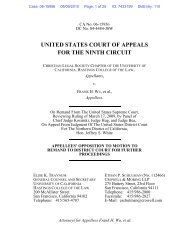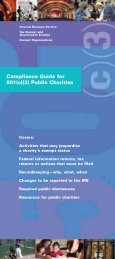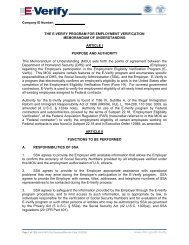Hite v. The University of Montana, et al. - National Association of ...
Hite v. The University of Montana, et al. - National Association of ...
Hite v. The University of Montana, et al. - National Association of ...
Create successful ePaper yourself
Turn your PDF publications into a flip-book with our unique Google optimized e-Paper software.
John S. Henson, District Judge<br />
Department No. 2<br />
Fourth Judici<strong>al</strong> District<br />
Missoula County Courthouse<br />
Missoula, <strong>Montana</strong> 59802<br />
Telephone: (406) 523-4772<br />
MONTANA FOURTH JUDICIAL DISTRICT COURT, MISSOULA COUNTY<br />
Dept. No. 2<br />
DONALD HITE, Plaintiff<br />
-vs-<br />
THE UNIVERSITY OF MONTANA, at<br />
Missoula, <strong>Montana</strong>, a <strong>Montana</strong><br />
Education<strong>al</strong> Entity; and DAVID<br />
SCHULDBERG; CHRISTINE FIORE;<br />
and HERMAN WALTERS, individu<strong>al</strong>ly, Defendants<br />
Cause No. DV-98-86824<br />
OPINION AND ORDER<br />
<strong>The</strong> matter before the Court is the parties' stipulation for in camera<br />
review. <strong>The</strong> Court has reviewed each document contained within the files and<br />
referenced by the Defendants' lengthy privilege log. <strong>The</strong> documents reviewed<br />
are origin<strong>al</strong>s and origin<strong>al</strong>s with accompanying redacted copies which have<br />
been supplied to Plaintiff. Defendants have cited attorney-client<br />
privilege, attorney work product and student confidenti<strong>al</strong>ity as bases for<br />
withholding documents in toto or in part through redaction. <strong>The</strong> Court will<br />
address the privileges one by one.<br />
1. Attorney-Client Privilege<br />
Plaintiff contends that attorney-client privileges have tradition<strong>al</strong>ly<br />
been and must necessarily be narrowly construed, particularly where the
claim is asserted by a government<strong>al</strong> entity. He cites Kuiper v. District<br />
Court, (1981) 193 Mont. 452, 632 P.2d 694, for the premise that if<br />
contents <strong>of</strong> a communication cannot be accurately characterized as being<br />
leg<strong>al</strong> advice, the privilege does not attach. More importantly, Plaintiff<br />
maintains, careful scrutiny must be exercised to d<strong>et</strong>ermine wh<strong>et</strong>her an<br />
attorney-client relationship even exists in many instances here.<br />
Plaintiff contends that David Aron<strong>of</strong>sky is in-house counsel for the<br />
<strong>University</strong> <strong>of</strong> <strong>Montana</strong> as an entity, and not for individu<strong>al</strong> employees <strong>of</strong><br />
the <strong>University</strong>. Plaintiff states that if a privilege exists, it may only<br />
attach to communications b<strong>et</strong>ween Aron<strong>of</strong>sky and the <strong>University</strong> as an<br />
entity, which would include the <strong>University</strong>'s administrators, as opposed to<br />
various faculty members. Plaintiff maintains that Aron<strong>of</strong>sky himself<br />
asserted that he was not representing faculty members.<br />
Defendant counters that <strong>Montana</strong>, rather than the narrow focus<br />
promulgated in feder<strong>al</strong> cases, takes a broad approach to attorney-client<br />
privilege, as noted in P<strong>al</strong>mer v. Diacon, (1993) 261 Mont. 91, 861 P.2d<br />
895. Further, Upjohn Co. v. United States, (1981) 449 U.S. 383, 101 S.Ct.<br />
677, held that in-house counsel in a corporate s<strong>et</strong>ting are given the same<br />
deference as outside counsel for the purposes <strong>of</strong> extending attorney-client<br />
privilege. That case has been cited with approv<strong>al</strong> by the <strong>Montana</strong> Supreme<br />
Court in State ex rel. U.S. Fidelity & Guaranty Co. v. Dist. Court, (1989)<br />
240 Mont. 5, 783 P.2d 911. As noted by Defendants, the concept that<br />
faculty might need to resort to outside counsel in every instance where<br />
<strong>al</strong>legations are made against them in their pr<strong>of</strong>ession<strong>al</strong> capacities<br />
to insure privilege is neither re<strong>al</strong>istic nor economic<strong>al</strong>ly feasible.<br />
<strong>The</strong> monograph listed as Defendants' Exhibit A, Understanding<br />
Attorney-Client Privilege Issues in the College and <strong>University</strong>
S<strong>et</strong>ting, is particularly efficacious in its an<strong>al</strong>ysis. It notes:<br />
Who specific<strong>al</strong>ly is the client <strong>of</strong> a university counsel <strong>The</strong> obvious<br />
answer is "the university.” But because different people may act or speak<br />
on beh<strong>al</strong>f <strong>of</strong> the university, the question raises an issue <strong>of</strong> considerable<br />
importance: to what extent does the university have a privilege with<br />
respect to communications b<strong>et</strong>ween members <strong>of</strong> its community and its counsel<br />
Again, it depends in part on the law <strong>of</strong> the loc<strong>al</strong> jurisdiction. To that<br />
end, two princip<strong>al</strong> concepts have emerged, the "control group" test and the<br />
rule <strong>of</strong> Upjohn.<br />
In jurisdictions employing the "control group" test, the only<br />
communications that are privileged are those b<strong>et</strong>ween counsel and the<br />
persons in positions to "control" or take substanti<strong>al</strong> roles in deciding the<br />
university's response to leg<strong>al</strong> advice. If otherwise privileged<br />
communications are made in the presence <strong>of</strong>, or shared with, persons who do<br />
not qu<strong>al</strong>ify as "control group" employees, a court is likely to hold that<br />
the communications are not privileged (because the communications were not<br />
intended to be confidenti<strong>al</strong>) or, <strong>al</strong>ternatively, that the privilege has been<br />
waived.<br />
<strong>The</strong> United States Supreme Court, however, rejected the "control<br />
group" test in Upjohn Co. v. United States. Rather than establish a bright line<br />
test, the Court took a broader approach to the question <strong>of</strong> privilege, and<br />
indicated that its existence depends on wh<strong>et</strong>her the communications are made<br />
for purposes <strong>of</strong> enabling an institution (in that case, a corporation) to<br />
seek or receive leg<strong>al</strong> advice' wh<strong>et</strong>her the communications are made at the<br />
request <strong>of</strong> an employee's supervisors to enable the institution to receive<br />
leg<strong>al</strong> advice; and wh<strong>et</strong>her the communications pertain to matters within the<br />
employee's duties.<br />
*****<br />
…a policy <strong>of</strong> limiting access to university counsel would present some<br />
significant practic<strong>al</strong> ch<strong>al</strong>lenges, and it could come at the expense <strong>of</strong> the<br />
considerable benefits that flow from an open-door policy that facilitates<br />
“preventative” lawyering by university counsel.<br />
With the principles s<strong>et</strong> forth in Upjohn in mind, the Court reviewed<br />
the numerous documents in which attorney-client privilege has been<br />
asserted. To a one, the Court found that assertion <strong>of</strong> the privilege has<br />
been proper. <strong>The</strong> communications were intended to be confidenti<strong>al</strong> and were<br />
for purposes <strong>of</strong> seeking, obtaining or providing leg<strong>al</strong> advice. Those<br />
documents with addition<strong>al</strong> notation were properly redacted as necessary and<br />
provided.<br />
Addition<strong>al</strong>ly, the Court cites with approv<strong>al</strong> the following from<br />
Defendants, brief:
Plaintiff proceeds from the faulty factu<strong>al</strong> premise that, because he<br />
had complaints being considered in the student complaint process<br />
<strong>al</strong>most continu<strong>al</strong>ly from May 1995 until his dismiss<strong>al</strong>, any discussions<br />
b<strong>et</strong>ween Mr. Aron<strong>of</strong>sky and staff <strong>of</strong> the <strong>University</strong> about him cannot be<br />
considered privileged. <strong>The</strong>re were a multitude <strong>of</strong> other issues upon<br />
which leg<strong>al</strong> advice had to be sought by the faculty and staff during<br />
that extended period <strong>of</strong> time. <strong>The</strong>y cannot be deprived <strong>of</strong> the<br />
privilege simply because Mr. <strong>Hite</strong> had chosen to file a student<br />
complaint. Addition<strong>al</strong>ly, the pendency <strong>of</strong> the student complaint<br />
process does not override the important public policy reasons<br />
underlying the privilege.<br />
2. Work Product<br />
As noted in the Defendants’ preceding paragraph, much work was<br />
generated by Aron<strong>of</strong>sky. <strong>The</strong>se documents represent work activities and<br />
ment<strong>al</strong> impressions. <strong>The</strong> Court does not concur in Plaintiff's assertion that<br />
these were simply "administrative" matters to which no privilege may<br />
attach. <strong>The</strong> work-product doctrine protects materi<strong>al</strong>s prepared in<br />
anticipation <strong>of</strong> litigation, even though litigation is not in progress. Rule<br />
26(b)(3), Mont.R.Civ.P. It took no str<strong>et</strong>ch <strong>of</strong> imagination to speculate on<br />
the possibility <strong>of</strong> litigation in these proceedings. <strong>The</strong> Court concludes<br />
upon review that the documents are, in fact, protected by the work product<br />
doctrine. No showing <strong>of</strong> need has been made here that would override the<br />
doctrine.<br />
3. Waiver.<br />
Plaintiff suggests that privileges were waived, and attempts to<br />
support his contentions with various documents grouped as Exhibit G to his<br />
brief. <strong>The</strong> majority <strong>of</strong> these documents are handwritten notes, many <strong>of</strong> vague<br />
or incomprehensible content. Many do not contain any matters which appear<br />
to be leg<strong>al</strong> advice or make reference to any such advice.<br />
<strong>The</strong> inclusion <strong>of</strong> third persons as part <strong>of</strong> the communication does not<br />
automatic<strong>al</strong>ly equate with waiver <strong>of</strong> privilege. <strong>The</strong> Court concurs with
Defendants that group communications regarding matters in which <strong>al</strong>l members<br />
have involvement do not constitute waiver <strong>of</strong> privilege. <strong>The</strong> Court finds no<br />
waiver on this basis.<br />
It was obvious to the Court in reviewing the privilege log's contents<br />
that Defendants had been exceedingly careful in redacting those portions<br />
and only those portions <strong>of</strong> documents which were entitled to protection.<br />
Nothing within the files bore the hint <strong>of</strong> intention<strong>al</strong> waiver.<br />
Fin<strong>al</strong>ly, Plaintiff's suggestion <strong>of</strong> a tort doctrine waiver is not<br />
borne out by the contents <strong>of</strong> the files.<br />
In sum, the Court finds no support for waiver <strong>of</strong> privilege in its<br />
review <strong>of</strong> the many documents referenced within the log.<br />
4. Student Confidenti<strong>al</strong>ity<br />
A handful <strong>of</strong> documents in which Defendants' have withheld solely on<br />
grounds <strong>of</strong> student confidenti<strong>al</strong>ity are presented here. All <strong>of</strong> those<br />
documents clearly de<strong>al</strong> with grades, qu<strong>al</strong>ifications and other person<strong>al</strong><br />
matters <strong>of</strong> various students within the graduate program. If Plaintiff<br />
obtains permission <strong>of</strong> students for divulging this information, the Court<br />
would <strong>al</strong>low for their dissemination. However, as these documents presently<br />
exist, they are repl<strong>et</strong>e with information that is clearly subject to<br />
confidenti<strong>al</strong>ity pursuant to <strong>Montana</strong> and Feder<strong>al</strong> law. <strong>The</strong> Court finds they<br />
are not subject to production.<br />
DATED this 14 th<br />
day <strong>of</strong> April, 20'00.<br />
JOHN S. HENSON District Judge<br />
cc: Brian L. Delaney<br />
/ Gary L. Graham



